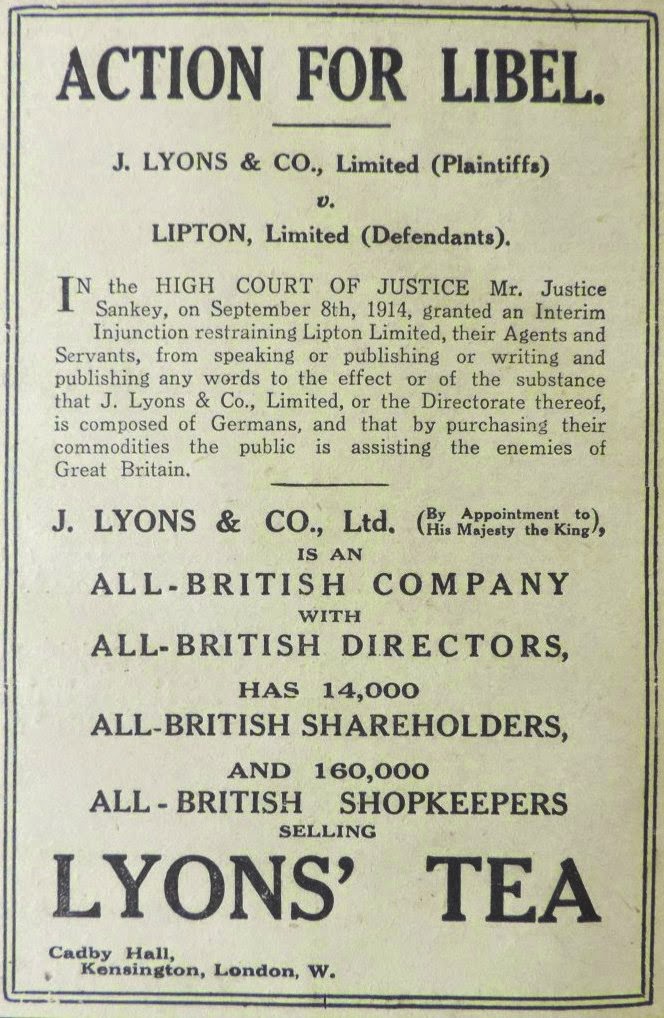From The Times, September 17, 1914.
[In August, The Times had started a regular column 'How to be useful in war-time'. It often included suggestions from readers (sensible or otherwise), as well as details of various appeals. By this point in September, there were often long lists of appeals for various units of the armed forces - I think for the men already on active service, with the Army or Navy.]
HOW TO BE USEFUL IN WAR TIME.
APPEALS FOR THE TROOPS.
MANY CHANNELS FOR BENEFICENCE.
We publish to-day a selection from the many appeals that continue to reach us. The great principal funds, it must not be forgotten, are still in need of all the support that rich and poor in their varying degrees can give, but those who have already written their handsome cheques for The Times appeal for the British Red Cross Society, or made their donations to the National Relief Fund, may still find the means and the inclination to send some little gift in kind, or a small sum, towards the purchase of "comforts" which will produce the pleasant feeling that the donor has made a personal present to some brave fellow at the front. And it is chiefly such appeals as these that we lay before our readers to-day.
GIFTS FOR OUR SOLDIERS AND SAILORS.
[The following is a selection from a longer list of appeals.]
The Ladies’ Emergency Committee of the Navy League earnestly asks for 5,000 woollen Helmets and 5,000 woollen mufflers for our sailors now in the North Sea. Parcels to the Navy League Depot, Langham Hotel, Portland-place, W.
Mrs. Jackson, Elmwood, Petersfield, Hants, is collecting warm garments for the men serving on board H.M.S Thunderer. Gifts of socks and stockings helmets, comforters, mittens, sweaters, and cardigans in dark blue wool; and cholera belts in natural wool, will be most acceptable.
Mrs. J. E. Capper, Commandant's House. Brompton Barracks. Chatham, asks on behalf of the men of the Royal Engineers for gifts in money or clothing, such as Army flannel shirts (collar bands not less than 16in.), socks with heels, mufflers, large mittens, cardigan waistcoats, and Balaclava helmets, all of dark colours, or for materials for any of these articles. Also small luxuries to include pipes, tobacco, chocolate, vaseline, and playing cards.
Lady Constance Pasley and Miss Allfrey are collecting comforts for the Royal Berkshire Regiment. Gifts of money or goods
[addresses given]. The following may be sent:—Toothbrushes, tobacco, pipes, handkerchiefs, cigarettes, cigarette papers, vaseline, carbolic tooth powder, boracic powder, chocolates, meat lozenges, socks, post-cards, pencils, lint, electric torches, hide bootlaces, and acid drops.
Mrs. Morris Richardson, Hurley House, Marlow, appeals for comforts for the 20th Hussars or money, flannel shirts (not less than 16 collar), socks, scarves, coloured handkerchiefs, woollen pants, leather boot laces, unsweetened chocolate, pipes, vaseline, and boracic ointment. All socks and shirts should be washed.
For the King’s Own Royal Lancaster Regiment khaki-coloured comforters, sleeping caps, knitted spencers, mittens with half-fingers, cholera belts, handkerchiefs, stout leather bootlaces, wooden pipes, soap, flat penny tins of vaseline, and good chocolate should be sent to Mrs. Alfred Dykes, 26, Palace Court, London, W.
Comforts and necessaries are requested for the Indian troops. Cigarettes, sweaters, socks, instras (for those on outpost duty), dubbin, tinned milk, subscriptions in money or kind should be sent to Mrs. Barry Hartwell, Liscarraig, Greystones, Co. Wicklow, for the Gurkhas; and to Miss Alice Bernard, The Palace, Kilkenny, for the Sikhs.
[Don't know what 'instras' are.]
Mrs. Bernard Grissell, wife of Captain Grissell (Norfolk Regiment), The Grange, Thorpe-road, Norwich, asks on behalf of the Norfolk Regiment for handkerchiefs, bootlaces, illustrated papers and magazines, chocolate, peppermint, acid tablets and drops, lime juice jujubes, cigarettes, tobacco, pouches, new briar pipes, tubes of vaseline, boracic ointment and boracic powder, indelible pencils, playing cards, dominoes, pocket knives, fancy soap. Shirts should be made of dark grey or khaki flannel, tin buttons very firmly sewn on, collar bands cotton, 15½in. or 16in. The feet of socks should be 10½in. long. Handkerchiefs of inconspicuous colouring.
[I like the preamble, in which The Times first instructs readers to send money to the main national funds before responding to these specific appeals, and then hints that their main effect might be to make donors feel good.
The lists of articles wanted are amazingly specific, and sometimes baffling. "Lime juice jujubes" I think means jelly sweets and perhaps the lime juice would prevent scurvy (though scurvy was not, I shoudl have thought, the most significant problem for the B.E.F. in France). Why 'fancy soap' for the Norfolk Regiment, and not plain ordinary soap? Why did the 20th Hussars want unsweetened chocolate, rather than regular chocolate? And whereas the 20th Hussars want coloured handkerchiefs, the Norfolk Regiment want them to be of "inconspicuous colouring". Do they simply mean that they don't want white ones?]








